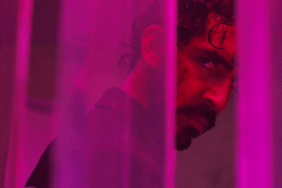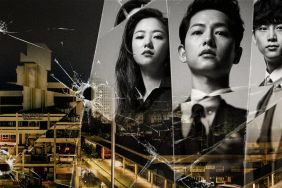When most people think of reggae, the first name that comes to mind is Jamaican superstar Bob Marley, whose legacy with The Wailers in bringing the musical genre to the masses outside his country is unmistakable even thirty years after his death. While most people know Marley’s music due to artists who have kept his songs alive, not as many people know about his life, the fact that he was the son of a white settler in Jamaica, the influence he held over the country’s political and criminal factor or the tragic way that he died at a far too young age.
These things and more are explored in a new documentary appropriate called Marley, the latest film from Kevin Macdonald, the versatile director whose resumé already included the semi-biopic The Last King of Scotland, as well as pseudo-docs like Touching the Void. We could share links to the half-dozen interviews we’ve done with Macdonald in the past, including twice last year for The Eagle and Life in a Day, but he’s always proven to be an insightful interview, so we sat down with him once again for a fairly extensive interview about his latest documentary.
ComingSoon.net: I remember speaking with you twice last year, and both times we spoke about “Marley,” so I was surprised you got it done so fast. I thought this would take years and years to complete.
Macdonald: Well, I was doing it sort of simultaneously with doing “Life in a Day.” I started going off and doing bits of interviewing. I did the Ghana bit of the front of the film, and I went to Jamaica once and did a few interviews, while I was doing “Life in a Day,” during that process. I first sort of got involved two years ago, and then it first started filming in October the year before last.
CS: I forgot that “The Eagle” was ready to go for September and then got delayed.
Macdonald: It got delayed till March, so “The Eagle” got finished in September and I went straight onto “Life in a Day.” Yeah, so I was basically very busy. The last part of that year I was doing three things at once. It’s nice I now have a couple of months off because originally we were thinking of trying to have this ready to come out like January.
CS: Okay, so you were trying to have it ready for Sundance?
Macdonald: Yeah, but in the end, interestingly the advice we got was that it would be better to take it to South By Southwest.
CS: And you were already there with it?
Macdonald: Yeah, I went there and it was fun because I’d never been before. “Life in a Day” showed there, but I didn’t go, but there are so many people, and you realize that film has a poor relation to the social media and computer stuff that’s going on. I felt a little bit inferior. (Laughs)
CS: Right, but this movie works with the festival’s musical origins and the vibe of Austin.
Macdonald: Oh no, and by the way, it went fantastic and we got great reactions from it. I think we did a premiere there and then we did three other screenings, but no, no, it was great, I just meant in general, the film festival feels like it’s the sort of poor cousin of the interactive festival. It was a good place to go, but that’s the real world, isn’t it? Interactive. That’s the big future money whatever.
CS: We may have discussed this, but when you came on board two years ago, did you approach the Marley estate or did they come to you?
Macdonald: No, it’s a complicated situation because I wanted to make a Marley film about six or seven years ago when it was Bob’s 60th birthday. I was going to take some rastas from Jamaica to Ethiopia where they were doing this big celebratory concert for Bob’s 60th birthday. I thought it’d be interesting way to talk about Bob, but also to talk about rasta and the connections between Jamaica and Africa, but it was going to be as an observational film. Then that didn’t happen, but while trying to do that, I got to know Chris Blackwell from Island Records, and he then was the one who recommended me to Steve Bing, who’s the producer on this. Two years ago, I got a phone call from Steve saying, “I’ve heard from Chris Blackwell that you’ve tried to make a Marley film in the past. Are you interested? I’ve got the rights.” He bought the rights to the music, and he got an agreement with the family that they would let him do it. He’d already tried two other directors before I got involved. I was a definite step-down in stature, because it started that Scorsese was going to do it, immediately after he did the Stones film “Shine a Light,” which Steve Bing also produced. Then, Scorsese had too many things stacked up and couldn’t do it. Then Jonathan Demme went some way down the road in doing something, but didn’t finish it, so I came on board. I had nothing to do with whatever the other two had done. I started it from scratch. It was Steve Bing’s passion really that drove the whole thing to happen because they’d done that initial negotiation over the music, which is the key thing, because you need all the music.

CS: Since you started from scratch, what was the first step? Did you have to do a lot of interviews first?
Macdonald: Yeah, all I knew I wanted to do was I wanted to get behind the myth, get behind the icon of Bob. We’re all so over-inundated with Bob imagery and Bob’s music is everywhere, but I’ve never seen anything that really showed who the man was. Who’s the flesh and blood individual? That was really my aim. I didn’t know how I was going to structure it or how I was going to make it, so, I just started doing lots of interviews–I interviewed about 80 or 85 people about half of whom are in the film–and through the process of meeting and interviewing them, I started to build up this sort of picture of the man, so it was a very organic process.
CS: One thing I like about the movie is that like you say, my familiarity with Bob Marley is only about the surface image and his music. I knew he was dead but didn’t know the details, and I’d think that even fans of his might not realize that stuff.
Macdonald: Part of that’s because he’s from the developing world. He was the third world superstar, you know? He came from a place and a time when nobody was interviewing him, there’s hardly any film footage of him. The first 11 years of his career, there’s not a single piece of moving footage. It’s an incredible thing, so from 1961 to 1972, there’s nothing, and it’s all just a few stills, not even that many stills. There’s a lot of mystery because of that, and also because he didn’t explain himself, he didn’t give a lot of interviews. People only really in a big way started to catch onto Marley right at the end of his life and then he died. There wasn’t the time for people to really absorb a lot. I think the lack of film footage and photos and stuff was one of the big challenges in making the movie, so we had to go out and find stuff and we did loads of research and spent 14 months with archive researchers plowing around looking in every archive, talking to the collectors just to find things that haven’t been seen before. There’s quite a lot of stuff in there that hasn’t been seen in the past. I think it’s a great relief because so many rock stars, we know everything about them and it’s all common knowledge what their careers are, but with Bob, there was a fresh story to be told.
CS: I was curious about dealing with the family and how much time you spent directly with them.
Macdonald: Well, as you’d imagine, you can’t make a film on Bob in the same way as you couldn’t make a film on Lennon or whatever without getting the permission from the family. All the kids–there’s 11 kids–they all agreed they wanted to make the film. Ziggy Marley was kind of the point person. He was the guy who sort of drove it. He really wanted to make the film. I met with him and we talked. I just said basically what I said to you, which was I didn’t know what the film would be, but I just wanted to go out and talk to lots of people, and let’s just see what picture of your dad’s emerged. He was very, very cool about it and very unintrusive, partly because he lives in L.A. and I’m in London, but they were completely open to me going down any direction, even people who for one reason or another, business-wise they had a falling out with. They said, “You have to talk to this person. They know part about Bob.”
CS: So did they help you contact people?
Macdonald: Yeah, with some of the people in the film. Sometimes they tried with people and didn’t succeed. (laughs) Two things we spent most of our time doing with this film was trying to find footage and photos and get permission to use them and negotiate with people, and then negotiating with interviewees to say, “Please, please talk.” Some of them like Allan Cole, who’s Bob’s great friend, the footballer, it took six months to get him to agree. We got eight months to get Bunny Wailer to agree to do it.
CS: Really? Wow. Bunny was amazing in the movie, and he’s really the guy you have to get on record.
Macdonald: Oh, he’s fantastic. Yeah, and of course that’s the thing. You’re sitting there thinking, “I can’t really make this movie without this one interview.” But it took months and months and months. There’s a lot of negotiations because it’s a lot of complex relationships going on there and a lot of things that happened in the past and a lot of fractured relationships. The main thing was that I made a film with Mick Jagger about ten or eleven years ago which I had a great time making and flew around the world with Mick and had such a great time, just me and him and a little camera, then it ended up being very unhappy because I got the film sort of taken off me and it was re-cut and the usual sort of thing, so I was a bit cautious going into this. I don’t want that to happen.
CS: Well, especially after Scorsese and Demme have already replaced on the project.
Macdonald: I think with Demme it was a difference of creative opinion, but I think with Scorsese, I don’t think he even got that far. It was purely just his schedule.

CS: Not that you weren’t busy yourself.
Macdonald: No, no, but I think that I was cautious about that, and I sought various reassurances, and they were given. I was really grateful and sort of impressed that they gave me such complete freedom. You can tell I think in the film in the way their interviews are, that they want to be totally frank and they’ve made that decision before. They didn’t want to make a boring, air-brushed, bland
It wants to feel like an authorized biography. It wants to feel like you’re really getting the full man, warts and all. I think they’re smart enough to realize that if you’re going to make something that’s really going to be good, it has to have depth. It has to have stuff about the drugs, it has to have stuff about the women, it has to have stuff about he was not necessarily the greatest father in the world. It has to have the things that are emotionally true and maybe a little bit painful.
CS: I think the stuff with his father’s family was especially powerful so was it hard getting them to talk?
Macdonald: Well, interestingly, with the cousin, no I mean, he was the only one who agreed to talk, that cousin. I was really grateful to him because I think he felt, “It’s my family history. It’s not to do with me, but I’m going to talk about it even though maybe it’s a little sensitive,” whereas Bob’s half-sister who also talked very movingly and listened to that song “Cornerstone,” she was again, very open and very emotionally raw. I think that’s one of the things I like about this film is that it sort of feels emotionally genuine and you get emotionally involved in his life story. Certainly seeing it with the family and various members of the family that I’ve seen it with, there’s a lot of tears. All of the kids who’ve seen it have said the same thing which is, “We learned a lot about our father.” There’s lots of stuff that they didn’t know.
CS: That’s amazing since you’d think that after thirty years, there’d be a lot of information out there.
Macdonald: I think there’s all these different people, some of whom they’ve never met or who they do meet and then they don’t talk. Ziggy was saying just yesterday to me–we were in an interview together in L.A. and somebody said to him, “When your mother talks about her feelings about your father as womanizing and about taking girls out of his bedroom or whatever, did you know about that?” Ziggy’s like, “No, she never spoke to me like that before.” Then he said, “But then, why would she?” You wouldn’t. Your mom wouldn’t do that. So I think that’s part of the motivation of the family doing it. There’s so much myth around him, so much conspiracy theory and thinking that he was killed by the CIA, people say, that let’s just before all the friends and colleagues die, let’s get them on camera and actually try and find out as much as we can.
CS: This really has to be immense closure for a lot of them.
Macdonald: Yeah, I think so. Particularly I think they find, as you’d expect, his illness and then going to Bavaria. They didn’t know anything about that whole Bavaria thing, which is extraordinary. Ziggy was again saying to me that that was really moving because they were sheltered from what was going on as you might with children. “Oh, your Daddy’s away. He’s going to come back soon.” Nobody’s telling them, “Your father’s dying and he’s in Germany.” So all they knew was he arrives back in Miami and they’re basically told. “Say goodbye to your father,” and he dies two days later.
CS: I’m really interested in Rita, who most people know as his wife, but I’m not sure anyone realized that she was his wife and touring with him, but he was with all these other women having kids, so was she harder to get to talk?
Macdonald: No, she was one of the first. She may be the first person I talked to.
CS: Wow, okay, so did you do multiple interviews with her?
Macdonald: I did two, but yeah, one in the morning and one in the afternoon. In the film, there are two interviews with her, and she’s wearing different clothes, and that’s because Rita likes to dress. I said, “Rita, we’re going to do a couple of hours in the afternoon and a couple of hours in the morning, but we’ll just make it seem the same, so just wear the same.” “No, no, I want to change for the afternoon. Which outfit do you want me to wear?” She loves to dress. I’m like, “This is not going to help my continuity, but well, okay.” (Laughs)
CS: Did you ever go back to anyone after you talked to all these other people?
Macdonald: Well, I maybe would’ve liked to have, but I did long interviews with everyone; I did a couple of hours at least with those people. Because I started out not really knowing where I was going, I just talked very generally in an exploratory sort of fashion, so no, I don’t think we went back to anyone.
CS: This is definitely a more conventional doc than “Life in a Day,” and “My Enemy’s Enemy” was maybe the closest you’ve come to that sort of telling of a story.
Macdonald: Well, I think for me, the decision to make it in such a straightforward way, it’s just got such a strong story, why get in the way? I didn’t want to put myself into it, I suppose, and also, it’s a complicated story. There’s a lot you have to tell people about what is rastafara, what is this political situation in Jamaica, gang warfare, and I felt like this is complicated. Nobody’s familiar with this story. I just have to tell it in a simple way, but also, I wanted to do it chronologically because I think that then there’s a sort of cumulative impact towards the end, you’ve been with him when he’s born, you’ve been with him, and then he gets ill. I think the impact of that is much stronger. Mostly it’s just because I think maybe it’s a reaction on “Life in a Day” which is so kind of out there and such an experiment, I suppose, to do something just that’s simple and classical.

CS: I want to ask about the concert footage, which I thought was amazing. Obviously, they didn’t have digital cameras back then, so where did this footage come from?
Macdonald: Well, wherever possible, we went back to whatever originally it was shot on, so some of the sort of sh*ttier stuff is early video and you can kind of tell it’s early video, but there’s some black and white footage of Bob and the not concert stuff that’s sort of hanging out by a river and under a waterfall and stuff, but that’s the earliest footage I think ’72 or ’73. Then, most of it still luckily at that time was filmed on 16. I think there might be a little Super 8 in there, but most of it’s 16, and we would go back and try and get back to the original film if we could, if we could find it.
CS: Were some of those concerts filmed for television as well?
Macdonald: Well, not for TV. There’s a clip in there of the song “War,” which is not that nicely shot because it’s video, but that was released as a concert film maybe. Maybe I’m wrong. Maybe it was a VHS or a concert video. Then there’s a concert in Santa Barbara which was shot very poorly on video, which was released as a VHS, but much later after Bob died. There’s one of those ironies that actually a lot of the concerts that were shot most professionally with multiple cameras or whatever tended to be the worst performances, which is kind of frustrating because there was another one which we didn’t really use any material from. It was the one that was professionally filmed in Germany in 1979 or maybe even early ’80. I think the performance is at the end of a tour and he’s obviously exhausted, whereas some of the bits that we found that were just sort of a single camera filming, that was the stuff where you got the magic of the performance, like when he does that amazing “Smile Jamaica” (concert), after he’d just been shot and he comes on and he shows the wounds. It’s sort of terribly shot by most measures, but because the performance is so f*cking great, you don’t care, and likewise with the amazing one where he brings the two politicians together up on the stage. Again, it’s kind of shot (badly), but you’re just so grateful there’s any record of those moments.
CS: The movie’s really consistent despite all these different sources.
Macdonald: Well, yeah, that was good color timing. (laughs)
CS: So where do you go from here? You’ve been kind of bouncing back and forth between docs and narrative films.
Macdonald: I’m doing a little feature called “How I Live Now,” hopefully. I’m still looking for my male lead. It’s all teenagers, and Saoirse Ronan from “The Lovely Bones” and “Atonement,” she’s the lead and everyone else is unknowns and it’s a kind of dark, dark teen love story. It’s set in a kind of alternative version of the present.
CS: Is that a script you found?
Macdonald: It’s a book, which a friend of mine wrote. The producer, who’s the co-producer on this film, Charles Steel, he had optioned his book and he had another director who was going to be doing it, and then that director fell away and he sent me the book and said, “What do you think of this?” I loved the book, so it’s just been sort of on the backburner for a few years and we’re hoping to start shooting in June if we can find a boy. (Laughs)
CS: The boy’s going to be an unknown?
Macdonald: Yeah, we’re doing a search. We’ve been searching for like four or five months. He’s kind of a quite specific type, so it’s been hard to find somebody.
CS: Saoirse’s so experienced at this point.
Macdonald: I know. That’s the point. She’s like such a pro. She’s so great. She’s so emotionally there. I think in a way it’ll be interesting because I think everybody else in the film, there’s a couple of little other parts in two or three scenes, but everybody else will be amateurs.
CS: You’ve been going back and forth between drama and docs, so do you see any throughline between all these movies you’ve been doing?
Macdonald: Not really, no. I think maybe some thematic interests, but I think I’m driven by my own curiosity, just what piques my interest, and almost I guess trying to not repeat myself, but I certainly like the idea of alternating docs and features.

CS: Not a lot of directors could pull it off, though. It’s tough.
Macdonald: Yeah, well I think that they’re very different disciplines and each one uses a different part of your brain, is what I think, and one’s left brain, one’s right brain. Documentaries is more of intellectual, more journalistic usually, not in “Life in a Day,” that’s sort of poetic, but usually it is. Then, yeah, when you’re doing a feature, it’s more about this artistic creative decisions, about color and camera style and creating something from scratch. I’d love to carry on and do both if I can.
CS: Have you been able to use some of the same crews between “The Eagle” and “State of Play” and other movies?
Macdonald: I’ve had the same editor on all of them, and a couple of times I used the same DP, Anthony Dod Mantle, he’s fantastic. I used the same designer and costume designer on “The Eagle” and “The Last King of Scotland.” It’s always nice to have the same people that you are familiar with and shorthand with obviously to be around you. I actually can’t on “How I Live Now” because it’s very low budget and because it’s kind of come together very suddenly, a lot of the people I’ve worked before are not available. A lot of them are busy, although Anthony hopefully will shoot it.
CS: I also wanted to ask about “Black Sea,” another thing you’ve been attached to. Do you generally have two or three things in development simultaneously?
Macdonald: Yeah, I don’t know what other directors say when you talk to them about it, but you don’t want to have too many things so then your brain is so scattered all over, but at the same time, you want to have a couple of things because as I was saying, with “How I Live Now,” what happens in a month if I can’t find a boy? Do I not make the movie and then think, “Oh my God, I’ve wasted all of this year. What the hell am I going to do?” So you want to have something else that hopefully you can get going relatively quick. That’s certainly how I feel about it. Again, that’s very different, very different. It’s a very down and dirty little B-movie set in a submarine. Again, it’s pretty small, it’s pretty small. I think I want to do something small.
CS: At this point, knowing you have those two projects in development, do you still regularly read scripts?
Macdonald: Yeah, I’ve got like six. You know how it works. Agents are always hopeful that until you’ve actually started shooting on something they’re like, “Oh, we might be able to get him onto this other thing.” (Laughs) As long as you’re not actually shooting as far as they’re concerned, you’re available; that seems to be the attitude anyway. Of course, I often think, they say to us, if you really love something and then you’re literally about to start, there’s been a lot of that stuff. It’s sent out to like 100 people and who responds to it and then you have to give them a pitch for the job, whereas I’ve never really done anything like that, where it’s been like, “Here’s a random piece of material.” I think everything that I’ve done I’ve been involved with for longer. Either you develop it from scratch or you take something and you develop it and you work on the script, but I’m not sure how good I’d be at just sort of taking a piece of material and being a director for hire like that. It’s probably tough.
CS: Wasn’t “State of Play” like that?
Macdonald: Well, I could tell you we did a script, which why I fell out with Brad Pitt. (laughs) I mean, there was a script, but I didn’t like it much, so I worked with Tony Gilroy on it to start again from scratch. I gotta do the thing that I wanted to do.
CS: Well, as they always say, “It’s a director’s medium” or at least that’s how it should be.
Macdonald: (Laughs) It should be
I wish!
Marley opens in select cities on April 20 i.e. 420. (Look it up if you don’t know the significance.)









